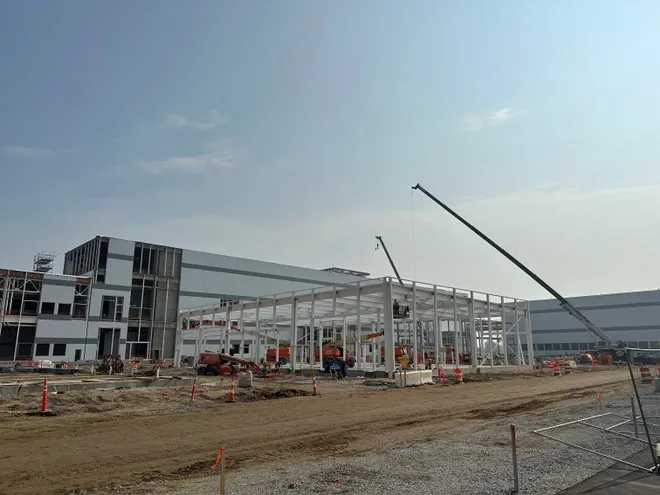
Michigan is getting a $3 billion investment for production of lithium-ion battery modules under a new supply agreement between LG Energy Solution and Toyota Motor North America, Inc., the two companies said Wednesday.
LG Energy Solution plans to install new production lines at its Holland plant in west Michigan for battery cells and modules to support the deal. Work on the plant is slated to be completed in 2025.
The battery modules will power Toyota’s expanding lineup of battery electric vehicles, initially supplying a Toyota plant in Kentucky that is slated to build a new EV starting in 2025.
Under the agreement, LG Energy Solution, which is headquartered in South Korea but has a significant presence in Michigan, will supply the modules at an annual capacity of 20 gigawatt hours beginning in 2025, according to a news release.
“At Toyota, our goal is to reduce carbon emissions as much as possible, as fast as possible,” said Tetsuo “Ted” Ogawa, president and CEO of Toyota Motor North America, in a statement. “Having secure supplies of lithium-ion batteries at scale with a long-term relationship to support Toyota’s multi-pathway approach and growth plans for BEVs in North America is critical to achieve our manufacturing and carbon reduction plans. Working with LG Energy Solution, we are excited to be able to offer products that will provide the performance and quality our customers expect.”
The agreement is the battery maker’s largest single supply agreement outside of joint-venture deals, the companies said.
“We’re excited to have Toyota, the best-selling global automaker, as our new customer. With our 30 years of experience in lithium-ion batteries, we will provide innovative power solutions to support Toyota’s push further into battery electric vehicles,” said Youngsoo Kwon, CEO of LG Energy Solution, in a statement. “The agreement also presents another big opportunity for us to strengthen our production capacity in North America, thereby bringing more real-life, large-scale progress toward electrification in the region.”
LGES, a company split off from LG Chem, has been producing cells in Holland since 2013. Its production here supports major automakers including General Motors Co.
In June, the South Korean battery supplier invited media to tour the construction site of a $1.7 billion, 1.7 million-square-foot expansion at the Holland plant. The expansion, announced last year, was slated to add 1,000 jobs and quintuple LG’s production output there from 5 gigawatt hours to 25 gigawatt hours. The company said at the time that construction would be done in 2024 and production of lithium-ion batteries for EVs would start in April 2025.
It was not clear if that expansion was the same as the project announced Wednesday or how many jobs would be created. LG Energy Solution did not immediately respond to questions from The Detroit News.
Toyota has said it plans to offer 30 battery electric vehicles globally across its Toyota and Lexus brands and that it plans to produce up to 3.5 million BEVs annually by 2030, even as it continues with its strategy of investing in hybrid vehicles as well.
The news follows Ford Motor Co. saying last month it has halted construction on a $3.5 billion EV battery plant project in Marshall amid a strike and tense contract negotiations with the UAW, organized local opposition, and scrutiny from Republicans in Congress over Ford’s planned use of technology owned by a Chinese company.
The Marshall plant was one of four projects around which state lawmakers and Gov. Gretchen Whitmer in 2021 built the state’s newest job-creating incentive program, the Strategic Outreach and Attraction Reserve (SOAR) fund. The program was established after Michigan lost out on an $11.4 billion investment Ford and a battery partner made for EV and battery production at two sites in Tennessee and Kentucky in September 2021.
In a statement Wednesday, Whitmer hailed the LG-Toyota agreement.
“Today’s announcement that LG Energy Solution and Toyota are partnering up to power electric vehicles in America right here in Michigan reaffirms our strategy to Make It in Michigan by building a landscape that encourages global investment while creating opportunities for people and communities across our state,” she said. “Together, we can continue growing our economy, creating good-paying jobs, and further cement Michigan as the global epicenter of the next revolution of the automotive industry.”
Michigan has attracted tens of billions of dollars in investment to support the burgeoning EV supply chain and EV assembly.
Jeep maker Stellantis NV has invested $4 billion into three Metro Detroit plant that offers it the flexibility to build fully battery-electric models in the future. Its NextStar Energy joint venture with LG Energy Solution also is building a $3.6 billion battery manufacturing plant in Windsor, Ontario, in Canada.
And LG and GM have a partnership to make battery cells for the Detroit automaker’s EVs. Together, the companies have three Ultium Cells LLC battery plants planned, including one in Delta Township near Lansing that will open in 2024.
In Michigan, GM has transformed its Factory Zero Detroit-Hamtramck plant for production of electric Hummers, Cadillac Escalades and trucks. It is also planning to transform its Orion Assembly plant for electric truck production. The electric Chevrolet Bolt is built there now.
And in addition to the paused project in Marshall, Ford is building three U.S. battery plants in Tennessee and Kentucky with South Korean battery maker SK On. The Dearborn automaker builds electric F-150 Lightnings in Dearborn.
Michigan also is home to Novi-based battery maker Our Next Energy, which has attracted significant investment on its quest to double the range of EVs using lithium iron phosphate battery technology.





























